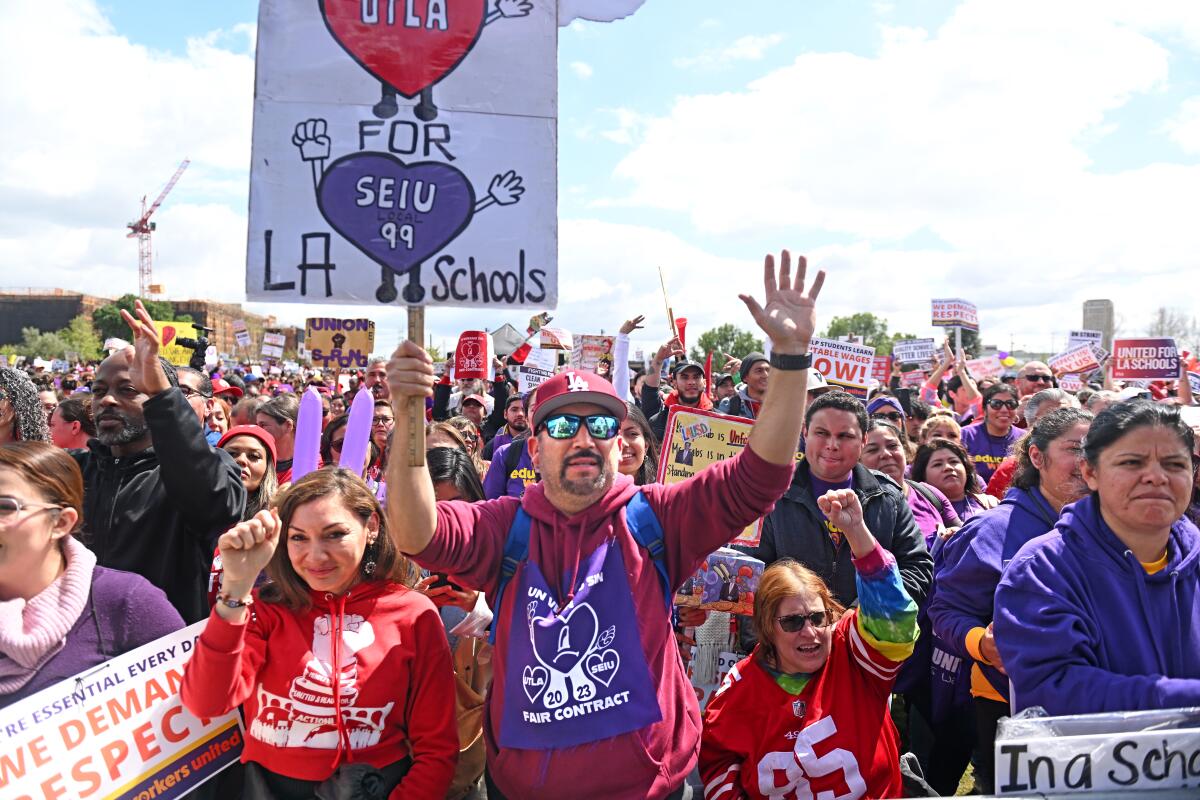LAUSD strike may have been illegal so trial can move ahead, labor board says

The three-day strike that shut down public schools in Los Angeles may have been illegal, according to complaints issued by state regulators, clearing the way for the district’s case against the two unions that walked out to move to a formal hearing.
The actions by the California Public Employment Relations Board do not represent a determination that the unions acted illegally. Instead regulators concluded that the Los Angeles Unified School District made a strong enough case to move to the next stage in the legal process.
The strike took place March 21-23. The labor board issued a complaint against one participating union on March 21 and the other on March 22, but neither the school district nor the unions announced the regulatory action at the time.
Shortly after, on March 24, L.A. Unified and Local 99 of Service Employees International Union reached a tentative agreement. Sometimes, disputes that reach the labor board are dropped as part of a contract resolution, but that has not happened so far.
The strike was led by Local 99, which represents about 30,000 school-district employees including bus drivers, food-service workers, teacher aides, special-education assistants, custodians and security aides. United Teachers Los Angeles urged its members to participate in the strike, a collaboration that, according to the school system, forced the shutdown of schools. UTLA represents about 35,000 teachers, therapists, counselors, nurses and librarians.
The labor board issued a separate action, called a complaint, against each union even though the cases are intertwined because of the joint strike.
Ellen Wu, an outside attorney for L.A. Unified, said a final legal determination on the district’s labor board cases is important to provide accountability for following state law, even though the strike has come and gone.
Because the unions walked out before completing the negotiation process, “not only have innocent children and their families been held hostage and suffered terribly,” she said, but the unions have “put LAUSD in an impossible situation.”
“If this violation has no consequences or remedies, then there is no negotiation process to follow in the future for any union,” Wu said.
A Local 99 spokesperson criticized the school district’s pursuit of the labor board case.
“This is yet another attempt by LAUSD to silence the voices of workers,” said Blanca Gallegos. “The three-day strike proved that workers will not be stopped in their demands for respect. LAUSD must focus on ending the harassment and intimidation of workers instead of engaging in legal tactics intended to further discredit their voices.”
In a statement, UTLA said that “instead of wasting time on legal maneuvers over the last two weeks that didn’t prevent a strike, LAUSD should have been focused on resolving the issues and respecting their employees. ... LAUSD had been pursuing every means possible to silence the 65,000 UTLA and SEIU 99 education workers who were braving the rain and wind while striking in protest of LAUSD’s actions.”
The next step in the labor board process would be a trial before an administrative law judge, which could happen in the next month or so, said J. Felix De La Torre, general counsel for the labor board. In such a proceeding, the school district would present evidence that the strike was illegal. The unions would then present evidence that it was proper. The judge would issue a ruling and, if L.A. Unified prevailed, would impose a remedy.
It’s not clear what that remedy would be.
Local 99’s legal basis for the strike was to protest alleged unfair practices by the school system. The union has accused the district of impeding the union and employees from exercising legally protected, union-related activities. The district has generally denied wrongdoing, but has not yet responded to every one of the more than a dozen cases filed by the union.
Examples of alleged wrongdoing by the district include:
- Surveillance of union members.
- Denying release time to participate in bargaining.
- Failure to provide information related to bargaining.
- Retaliation in the form of a poor evaluation or changed assignment for union-related activities.
The union also accused the district of improperly rescheduling optional extra learning time for students — which affected when union members could choose to work. The schedule change occurred after the district yielded to pressure exerted by UTLA.
In this instance, the district got it from both sides. UTLA filed an unfair practice charge over the original acceleration day schedule. Local 99 filed an unfair practice charge after the district changed the schedule to placate UTLA.
The district has filed its own cases against the unions, and last week’s labor board action relates to those filed with the board on March 17, a last-ditch effort to avoid the strike that began March 21. District officials asked the labor board to issue an immediate injunction to prevent the walkout.
The board declined to do so — and it would have been extremely unusual for it to intervene in this way without a careful review of evidence, legal experts have said.
Union leaders declared this lack of intervention as a victory — and it was, in that it allowed the strike to go forward. But the case remained active. The board authorized an “expedited” review, and that did nothing to shorten the strike, but the review did proceed.
Issuing a complaint does not mean that the board has sided with the district and against the unions, said De La Torre, the labor board’s general counsel.
“What it means is we look at the facts by the district against the unions,” said De La Torre. Regulators ask the question: “If those facts were proven true at an evidentiary trial, with witnesses and documents, would it amount to a violation of state law? And if the answer would be yes, we issue a complaint. So that’s what we’ve done so far.”
According to the complaint, the current bargaining cycle with Local 99 began Feb. 16, 2022, and by late December the two parties “started participating in impasse procedures,” part of a required step-by-step process that has yet to be completed.
Staging a strike under these circumstances is illegal, according to the complaint.
The case, if it isn’t settled, will hinge on whether the events leading up to the strike justify an unfair-practice walkout or whether the unfair-practice allegations were simply a pretext to stage a strike as a pressure tactic.
The complaint issued against the teachers union describes a similar scenario, although the teachers union and district are not as far along in bargaining. The complaint states that UTLA “had not initiated or completed impasse procedures” and that it “encouraged bargaining unit members to engage in a three-day sympathy strike” while it “failed and refused to bargain in good faith” in violation of state law.
In an effort to avoid a legal challenge on other grounds, both unions formally terminated their expired contracts, which included anti-strike provisions. The tentative agreement with Local 99 allows for sympathy strikes, according to the union.
The labor board issued its complaint against Local 99 on the first day of the strike and against UTLA on the second day of the strike.
More to Read
Sign up for Essential California
The most important California stories and recommendations in your inbox every morning.
You may occasionally receive promotional content from the Los Angeles Times.











